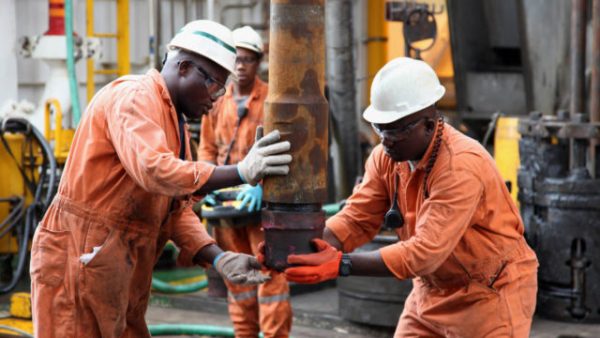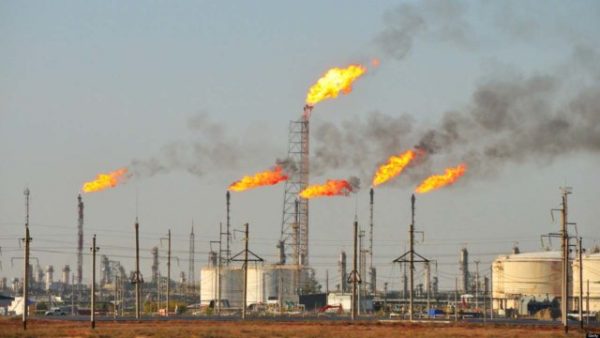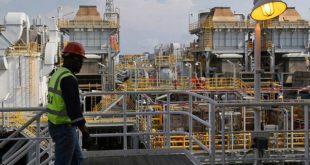 Nigeria’s oil and gas sector faces hard times in 2015 as uncertainties trail what is likely to be a closely fought presidential election in February as well as concerns over the non-passage of the Petroleum Industrial Bill (PIB) in addition to dwindling oil prices.
Nigeria’s oil and gas sector faces hard times in 2015 as uncertainties trail what is likely to be a closely fought presidential election in February as well as concerns over the non-passage of the Petroleum Industrial Bill (PIB) in addition to dwindling oil prices.
Oil production and prices remains the cornerstone of the Nigerian economy. Now prices are falling and a sustained fall in oil prices in 2015 portend profound challenges for especially indigenous oil and gas companies in the country.
Several rounds of divestments which are anticipated to be concluded in 2015 present a significant year for indigenous oil firms to dominate the industry, through acquisition of these relinquished assets.

Well before the current oil price slide, Shell, Total, Eni and Chevron sought to dispose of assets from Nigerian onshore, which is plagued by industrial scale oil theft, insecurity and spills.
Government’s policy since 2010 has been to increase the role played by local firms, both in operating oil blocks and trading, with the aim of ending decades of control over the industry by foreign majors.

The policy has facilitated the completion of a $1.5 billion ConocoPhillips assets purchase by Nigerian oil company, Oando, in the largest single upstream acquisition done in the country’s industry by an indigenous company last year.
A stock market debut by local oil and gas firm, Seplat in Lagos and London last year is likely to unleash a round of initial public offerings (IPOs) in Nigeria this year.
Analysts say what will be defining moment for the sector in 2015 are a few deals currently awaiting ministerial consent. When approved, they could see Nigerian Independents control 20 to 25 per cent of the country’s oil production (currently 10 – 15%).
“At the moment, we have a number of oil and gas transactions (across the value chain) awaiting the elections. These transactions are worth over $10 billion and could be more as IOC divestment is likely to intensify,” said Dolapo Oni, Head of Energy Research at Eco Bank.
However, if oil prices continue to slide with some rather extreme scenarios of under $40, oil and gas companies in Nigeria will face some difficulties with meeting payment of their facilities at banks.
According to a separate data sourced from the National Petroleum Investment and Management Services (NAPIMS), the investment arm of the Nigerian National Petroleum Corporation (NNPC), the federal government lost an estimated $100 billion in revenue between 2007 and 2012 from inability to meet crude oil production targets.
There are fears also that participation of indigenous oil companies in the upstream sector in 2015 may remain sluggish as uncertainty still hovers around the planned marginal field licensing round, more than one year after government announced it would conduct the exercise.
Minister of Petroleum Resources, Mrs. Diezani Alison-Madueke, had announced on November 28, 2013 that the bid round would be completed by March, 2014 but this failed to meet several take off deadlines.
The proposed oil bid round by the federal government is not likely to happen this year because the body language of the government does not suggest its preparedness to auction the nation’s oil acreages to potential buyers.
There are indications that it is no longer at easy with employers of labour in the sector who would have no choice than to engage in cost-cutting measures such as right-sizing of work force in order to stay afloat in their business.
But the two unions in the sector may protest the development in form of strikes which will threaten the nation’s oil production or unsettle the sector which is the mainstay of Nigeria’s economy.
Nigeria would experience drop in oil revenue in 2015 if the sliding oil price, incessant shut-down and shut-in of trunks and pipelines at various terminals are not nipped in the bud. The gross revenue of Nigeria for November dropped of N36.6 billion to N500.07 billion, as against N536.69 billion last October.
Nigeria’s crude oil export volume which dropped by 33 percent margin last October and November is not likely to climb phenomenally because the United States of America and other big time buyers of the nation’s product have found other sellers. They are also exploring other alternatives to oil like Shale gas.
Nigeria’s long-awaited PIB is not expected to be voted on by parliament before the general elections in February 2015.
The bill has dragged on for over five years because of political wrangling thereby denying Nigeria about $37 billion in private sector investments in the oil and gas industry in the last five years, according to data released by Wood Mackenzie in 2013.
The report listed reduced investments, reduced crude oil production, reduced government revenues, increased debt and increased borrowings as some of the effects of the non-passage of the PIB.
The House of Representatives shifted the goal post for the passage of the Petroleum Industry Bill to 2015 but it is doubtful if that would happen this year. Notable lawmakers, who had made brilliant inputs into the bill, would not come back to the house and the new ones would usually request for time to learn the rubrics of the bill. Nigeria would therefore continually lose more investment opportunities in 2015 due to non-passage of the bill.
There may be merger deals among operators of non-performing marginal fields to bring same back to production. This is necessary in order to escape federal government threat to sanction them by March
In 2015, multi-national oil companies in Nigeria would continue to shed their oil assets to smaller companies in the country. It is not likely that the government would win the war against crude oil theft and pipeline vandalism.
The new gas price approved by the government will shape the price template for the product but unsettle gas users, especially manufacturers in the country.
Nigeria would witness increase in the consumption of liquefied petroleum gas this year due to the efforts of the government and the Nigeria Liquefied Natural Gas Company to increase supply and production of domestic gas.
The planned turn around maintenance of the nation’s refineries may turn out to be a wishful thinking as Nigeria would continue to import petroleum products this year.
Generally, the outlook for the entire industry is gloomy. With large offshore oil and gas discoveries, cheaper prices and more liquefied natural gas (LNG) projects coming on stream in 2015, countries across Asia, Africa and Europe are planning to cut dependence on supplies from Nigeria, a situation which may shrink Nigeria’s share of oil and gas exports to the world markets.
 MMS PLUS NG – Maritime, Aviation, Business, Oil and Gas News Online Newspaper with coverage in Maritime, Oil and Gas, Aviation, Power and Energy as well as Financial News
MMS PLUS NG – Maritime, Aviation, Business, Oil and Gas News Online Newspaper with coverage in Maritime, Oil and Gas, Aviation, Power and Energy as well as Financial News









